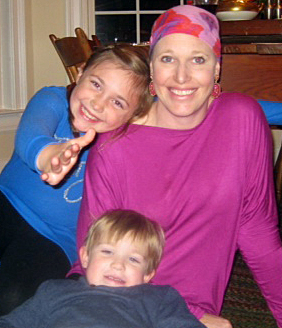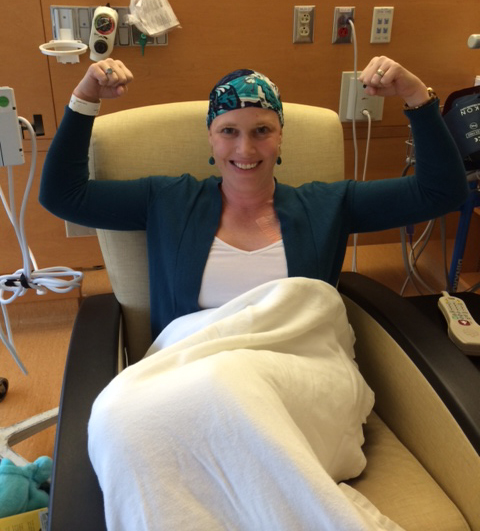A busy mom of two, Ellen Martin battled breast cancer with two powerful weapons – resilience and research. Following an aggressive breast cancer diagnosis, Ellen is now in remission thanks to a treatment plan driven by the latest findings in breast cancer research.

During the summer of 2014, Ellen Martin was a busy mom with two kids heading into vacation mode.
“We were down at the beach with my parents. I remember saying to my mom, ‘Something is telling me to get this checked out’,” recalls Ellen. A few weeks earlier, she had noticed a knotty lump under her arm.
When she got back home from vacation, Ellen went in for a mammogram and an ultrasound. Based on the results, her doctor recommended she get a biopsy the same day.
“Then I waited for the results,” said Ellen. “That was a long three days.”
During those three days she reached out to neighbor and long-time friend Dr. Carrie Lee. Lee, a thoracic oncologist at UNC Lineberger Comprehensive Cancer Center, helped her friend through those three days.
Then the phone call came.
“I was on my back porch and they told me it was cancer.”
Ellen immediately reached out to Carrie.
“I texted her. Just three words. ‘I have cancer.’ I knew Carrie would understand.”
Ellen then came to UNC and immediately began chemotherapy in August 2014 under the treatment of medical oncologist Carey Anders, MD. Following pathology review of her tumor, UNC doctors discovered that Ellen’s cancer was both ER (hormone receptor) and HER2 (human epidermal growth factor receptor) positive, a type of tumor that is aggressive and feeds both on the hormone estrogen and the HER2 gene.
“Based on those results, we were able to map out a treatment plan with targeted therapy to treat Ellen’s specific type of breast cancer,” said Anders. Ellen began an 18-week course of trastuzumab and pertuzumab in combination with two additional chemotherapy drugs, a regimen that was recently approved by the FDA within the last 18 months.
“These drugs work to shut down the HER2 pathway – essentially the driving forces behind the cancer,” said Anders.
Following the chemotherapy regimen, Ellen elected for breast conservation and underwent surgery with surgical oncologist Karyn Stizenberg, MD followed by a six-week course of radiation under the care of radiation oncologist Ellen Jones, MD.
While Ellen was undergoing radiation, Dr. Anders attended the 2014 San Antonio Breast Cancer Symposium, probably the biggest breast cancer research meeting in the country.

“I literally was in the meeting, hearing these amazing results and thought immediately of Ellen,” recalled Anders.
During that meeting, findings were presented about the effects of ovarian suppression on breast cancer recurrence. The research found that adding ovarian suppression to five years of either tamoxifen or exemestane following chemotherapy, in women with hormone receptor-positive early breast cancer, provided a markedly greater reduction in breast cancer recurrence compared with standard therapy with tamoxifen alone.
“Ellen was the perfect candidate for this new treatment approach,” said Anders.
They began the combination of medication shortly after the research results were presented.
“As a patient, it was just amazing to benefit so greatly from the latest in cancer research,” said Ellen. “The doctors at UNC stay on top of the research in their field and then take that back and immediately put it into practice.”
Now in remission, Ellen looks to direct her passion towards raising awareness about the importance of cancer research. On May 7, 2015, she traveled to Washington, DC to participate in the 2015 Capital Hill Day for Cancer Research, an event hosted by the American Association for Cancer Research, Association of American Cancer Institutes, and American Society of Clinical Oncology.
“I have benefited so directly from transformative cancer research that I feel compelled to do anything I can to let my elected officials know how important investments in cancer research are to saving lives,” said Ellen.
